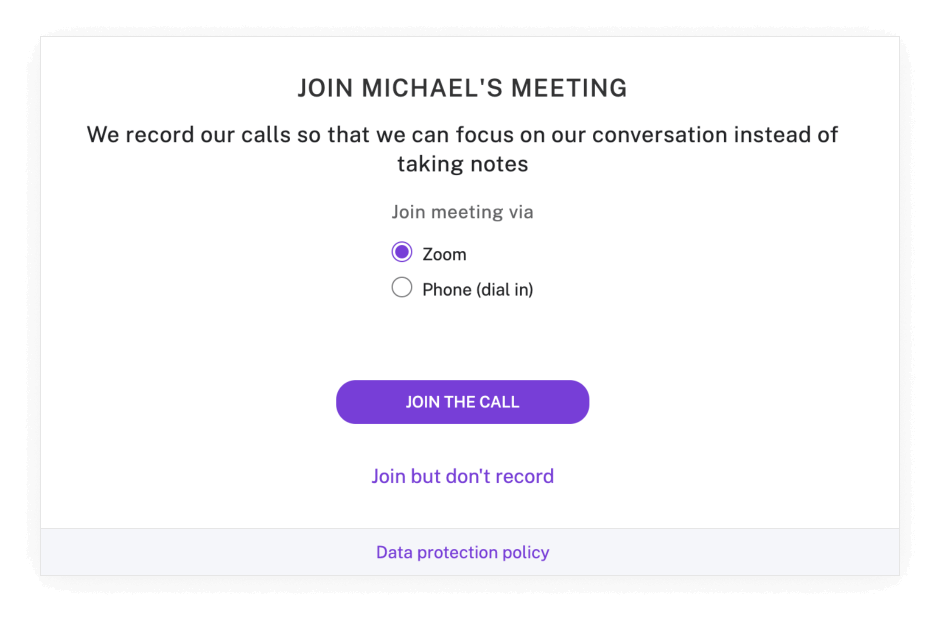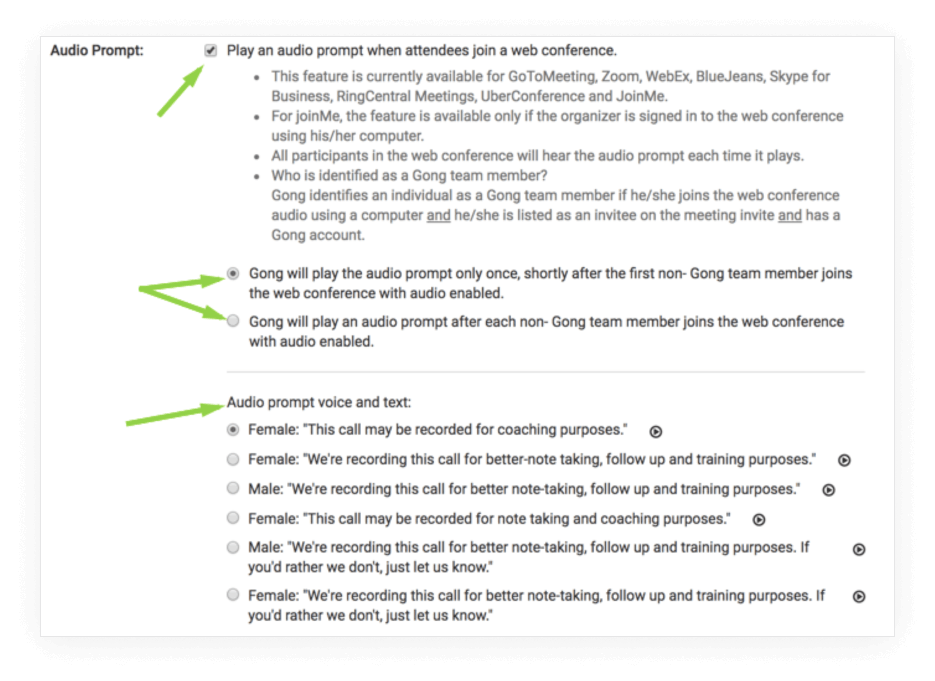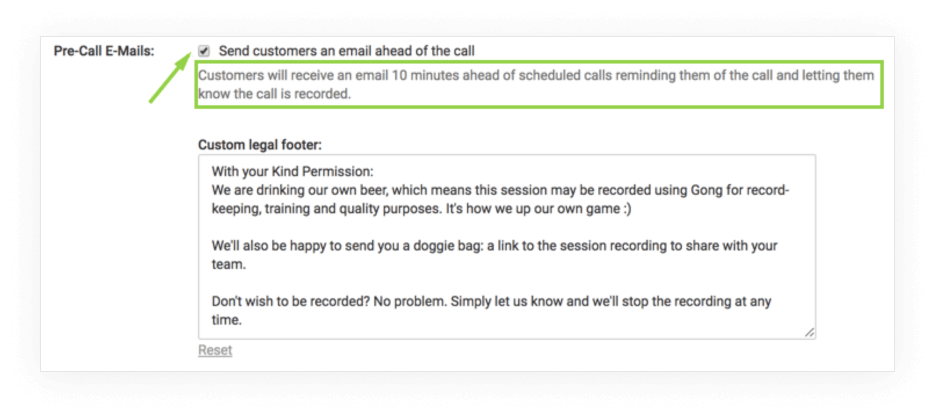Sales Call Recording Laws and Regulations (and How Gong’s Two Party Consent Platform Helps You Stay Compliant)
DISCLAIMER: The information provided on sales call recording laws is for informational purposes only and is not legal advice. If you have any legal compliance questions, please consult your legal counsel.
When it comes to sales and business call recording laws and regulations in the United States, states adopt either a one-party or two-party (also known as all-party) consent policy. One-party consent policy means that you’ll you need consent from one of the parties participating in a call in order to record. As of the time of the publish date of this article, 10 states cited below have opted for a two-party (or all-party) consent policy, where all parties have to be informed that the call is being recorded. Here at Gong, we always obtain consent from all parties when we use Gong, regardless of the states where call participants reside or the call purpose.
Business Call Recording Laws by State:
As of the publish date of this article, one-party consent states include Alabama, Alaska, Arizona, Arkansas, Colorado, Connecticut, District of Columbia, Georgia, Hawaii, Idaho, Indiana, Iowa, Kansas, Kentucky, Louisiana, Maine, Michigan, Minnesota, Mississippi, Missouri, Nebraska, New Jersey, New Mexico, New York, North Carolina, North Dakota, Ohio, Oklahoma, Oregon, Rhode Island, South Carolina, South Dakota, Tennessee, Texas, Utah, Vermont, Virginia, West Virginia, Wisconsin, and Wyoming.
Two-party, or all-party, consent states include California, Delaware, Florida, Maryland, Massachusetts, Montana, Nevada, New Hampshire, Pennsylvania, and Washington.
International Call Recording Laws:
International business call recording laws and regulations vary widely. Many countries do not have specific business call recording laws, or even regulations covering telecommunication issues. Other countries might specify details around how consent needs to be obtained based on subject matter. There are even some countries or industries that do not allow call recording at all. When in doubt, consult with a lawyer. Here are a few jurisdictions that our customers frequently encounter when using Gong:
Canada
Canada has an “all-party consent” approach. To record a call, you need to obtain informed consent by notifying others on the call: (1) You intend to record the conversation (2) Any purposes the recording will be used for (3) That the call may only be recorded with each person’s consent. For more details on Canada’s approach, you can take a look at the Privacy Commissioner’s Guidelines for Recording Customer Calls.
Europe and the UK
Be sure you’re compliant with the GDPR and other country-specific regulations when recording in participants in European Union member states, and the UK GDPR when recording participants in the United Kingdom. Generally speaking, inbound and outbound calls with participants in European Union member states and the UK require consent from all participating parties. When you use web conferencing, you can deploy the ‘Gong Welcome Page’, which gives participants the option to join the recorded call or to join the call without it being recorded. Here is what that looks like:
Australia
If a call is to be recorded or monitored, you must inform parties at the beginning of the conversation. This allows the respective parties to have the chance to either end the call, or to ask to be transferred to another line where monitoring or recording does not take place (if this is available). In the state of Queensland, however, it is not illegal to simply record a telephone conversation if you are a party to the conversation. For more details on Australia’s call monitoring, check out the surveillance and monitoring guidelines from the Office of the Australian Information Commissioner.
Calls recorded by a customer’s phone system (e.g., SalesLoft, OutReach, RingCentral, etc.) are subject to the same privacy rules as sessions recorded by Gong. Review your call recording policies with your legal team, especially if you plan to start recording calls following a deployment of Gong.
How Gong Helps You Stay Compliant with Call Recording Laws
There are four ways Gong’s two-party consent platform helps you maintain compliance with the above call recording laws.
1) Automatic Audio Prompt
Gong features a setting that allows you to play a short, automated message when new attendees join a web conference meeting. This automates the process of notifying your customer that the call is being recorded, and gives you the peace of mind that it happens on every meeting.
You have two options for playing the audio prompt:
- One time: When the first external meeting attendee joins the call, or
- Multiple times: Every time an additional external meeting attendee joins the call.
This second approach ensures every external meeting attendee hears the audio prompt, regardless of when they join the meeting.
2) Email Alerts for Calls Without Call Recording Notification Language
You can setup Trackers in Gong that alert you every time a particular type of call happens that doesn’t contain compliance notification language.
Once you save your filter criteria, you can then choose your email alert settings, opting to receive an email alert every time a call happens where recording compliance language was not mentioned.
3) Custom Legal Footers in Pre-call Emails
To notify meeting attendees ahead of time that an upcoming meeting will be recorded, you can configure Gong to send an automated email to all invited attendees a few minutes before the meeting starts, explaining that the meeting will be recorded.
4) Redact Sensitive Information
Finally, if you’re concerned that your calls may contain information that you’d rather not record (such as social security or credit card numbers), you can configure Gong to automatically “redact” segments of calls where sensitive information is mentioned.
All in all, Gong provides a lot of easy-to-use options for helping you maintain compliance with call recording laws.
Learn how to enable these features and more by signing up for a demo of Gong today.




